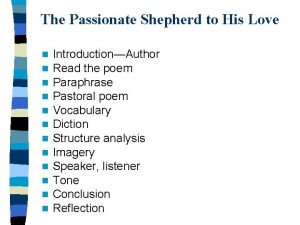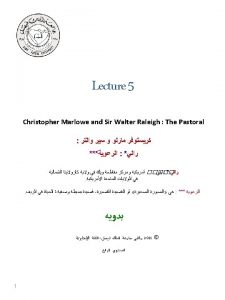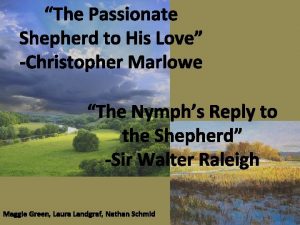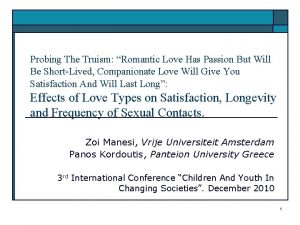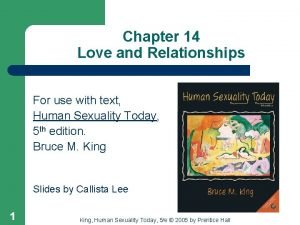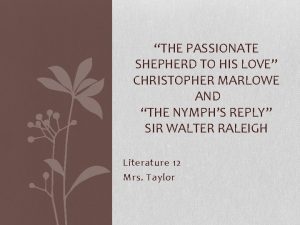The Passionate Shepherd to His Love Latin expression











- Slides: 11

The Passionate Shepherd to His Love

Latin expression: carpe diem. Many poets of the nineteenth century would use the Roman poet, Horace's sentiments from his “Odes”: Scale back your long hopes to a short period. While we speak, time is envious and is running away from us. Seize the day, trusting little in the future.

• Carpe diem poetry came from Italy and had two main themes: • the quick passing of time • the transiency or shortness of youth; • advice, entreaties, and encouragement. • old advised the young not to waste their youth • would-be suitors begged the ladies not to mature to old age so fast. • recurring theme in the poetry of the day is to have fun now because time is limited. • During the Renaissance, why was the carpe diem concept so popular?

Popular during the Renaissance • the average life expectancy for an English Renaissance poet was forty-five years old • a person could die from: • a sickness • fighting in a battle • being imprisoned or even executed • explain the human need for sensual pleasures and ardor.

The Passionate Shepherd to His Love • Squawkbox • Read poem • Is carpe diem actually mentioned? • What are the short-lived pleasures that are transient and don’t last?

The Nymph’s Reply • Squawkbox • Read poem • Raleigh's poem is an answer to Marlowe's. Using the nymph's voice and her skepticism, she rejects the shepherd's lovely words and promises. Through the nymph's voice, Raleigh advises not to “seize the day” just because time flies; — consequences are inevitable.

Pastoral - a work that idealizes the simple shepherd's life in the country, stemming from the Latin word pastor, meaning shepherd. • focuses on nature and the uncomplicated lifestyle of a shepherd in comparison to the complexities of society. • idealizes or romanticizes the simple life in the country and beautiful landscapes in nature • Many are about the pursuit of sensual love • began in the Greek oral tradition • What are key concepts in pastoral poetry? How is it different from carpe diem poetry? • (o slides)

Why do you think people during the Elizabethan era were so intrigued by the simple, almost “boring” life of a shepherd?

Why do you think people during the Elizabethan era were so intrigued by the simple, almost “boring” life of a shepherd? • England teemed with crime and disease • people were enamored with the idea of the lovesick shepherds in rural settings • pastoral poem renounced corruption found in urban areas and returned the reader to the simplicity of nature • In 16 th-century London, the courtiers and many city dwellers were enjoying foreign luxuries and merchandise • pastoral poem created a realm different than the courtly pleasures with which they were familiar and experienced.

O video – figurative language The Passionate Shepherd to His Love • The shepherd creates an argument and tries to woo a love interest to experience the joys of nature. • What does the shepherd desire? • What does he tell his love interest? • What does that imply about what their life could be like? • Is this realistic? Can two lovers spend all day in each other's warm embrace? What are the consequences of all play and no work?

Nymph’s Reply • How is the young lady realistic? Why can’t they be together? • One wants the young maiden to live a free life in nature and the other wants her to be smart and think about tomorrow. • Which speaker from the poems do you prefer? • Do you like the idyllic shepherd or the realistic maiden? • Who would you represent in a debate?
 A belt of straw and ivy buds
A belt of straw and ivy buds The passionate shepherd to his love analysis
The passionate shepherd to his love analysis Shepherd syllables
Shepherd syllables Wanton fields
Wanton fields The passionate shepherd to his love summary
The passionate shepherd to his love summary The passionate shepherd to his love literary devices
The passionate shepherd to his love literary devices Spenser
Spenser Passionate love vs companionate love
Passionate love vs companionate love Passionate love vs companionate love
Passionate love vs companionate love Passionate love vs companionate love
Passionate love vs companionate love Richer than gold is the love of my lord lyrics
Richer than gold is the love of my lord lyrics Heightened verse
Heightened verse

